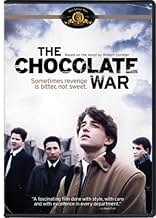Ajouter une intrigue dans votre langueThe Vigils are a gang of students at Trinity Catholic School... part of the tradition. They control the other boys by intimidation and the threat of violence.The Vigils are a gang of students at Trinity Catholic School... part of the tradition. They control the other boys by intimidation and the threat of violence.The Vigils are a gang of students at Trinity Catholic School... part of the tradition. They control the other boys by intimidation and the threat of violence.
- Récompenses
- 2 nominations au total
- Archie
- (as Wally Ward)
- Emile Janza
- (as Brent Fraser)
Histoire
Le saviez-vous
- AnecdotesThe film's music budget was about $15,000. Most of the artists featured on the soundtrack allowed the filmmakers to use their songs at bargain basement prices. David Bowie wanted $100,000 to use his song "Heroes" during the final scene and credits, so Kate Bush's "Running Up That Hill" was substituted. In exchange for the use of two of his songs, and in light of the difficult subject matter of the film, musician and activist Peter Gabriel requested that his affiliation and support of the human rights organization Amnesty International be included in the film's post-credits.
- Citations
[Archie is on the phone with Janza who has just told Archie about him and a gang beating up Jerry]
Archie Costello: [into the phone] WHAT? Janza, can't you do anything right?
Emile Janza: [into the phone] Hey, you said that the guy should take a hint about what he's up against. So, I thought I give him a brutal ass-kicking to show him that it's not nice to mess around with the Vigils. I asked some kids to assist me with the brawl.
Archie Costello: [into the phone] Who were they? I don't want outsiders involved in this!
Emile Janza: [into the phone] Just some animals that live in my neighborhood. They'd beat up their own grandmothers for a dollar.
- ConnexionsFeatured in Camp Midnite: Show 104 (1989)
- Bandes originalesIn My Room
Performed by Yazoo (as Yaz)
Written by Vince Clarke
Used with permission of Stainless Music (BMI) on behalf of Sonet Records and Publishing Ltd.
Courtesy of Sire Records / Mute Records
By Arrangement with Warner Special Products
Our young protagonist, Renault, still agonizing over the death of his mother, is given a right-of-passage style task by his school's secret society, run by the calculating and elagantly power-hungry Archie : To refuse to sell chocolates to boost school income for 10 days (an activity Brother Leon, the equally power-hungry John Glover, is pushing on the students with unexpected zeal). But when his ten days are up, he still refuses to bend to the will of a system that wants only to use him as a tool. Both Archie and Brother Leon then use every method in their power to keep this rebel without a cause from toppeling them from power.
Simple enough, but this, as I said, is not a simple film about fighting the powers that be. The protagonist actually has little to say about his own action: he's so opaque that it seems even HE doesnt know exactly what he's rebelling against, just that he can't give up. He doesnt really know what he's doing, and as his life is made more and more awful by Archie and Brother Leon, it becomes increasingly clear he doesn't enjoy it either. He simply feels compelled to, and stoically refuses to give in, despite the obvious pointlessness of his rebellion and the cruel consequences that ensue. But this makes for a very hard hero to identify with and root for.
In fact, most of the film revolves around Archie and his attempt to break Renault's will. Archie is very talkative, and in fact the camera seems oddly attracted to his mercilessness, elegance and charisma, even as we assume we're supposed to revile him. Even creepy John Glover plays his villain very straight, giving only a vague, intangible sense of menace. By creating a hero we can't understand and villians we gravitate towards, the film subtly creates a situation where we can't really take sides, and can only observe the pathetic hopelessness of both situations. After all, this is all about selling CHOCOLATES. This throws the entire proceedings into an almost absurdist light. Light touches of humor (including a brief but spot-on perfect cameo by "Harold and Maude"'s Bud Cort) reinforce this classification and keep the proceedings from ever becoming bogged down in their gloominess.
All in all, though, The Chocolate War is a very dark, slightly surreal tale of the emptiness of life, for winners or losers. It suggests that, fight the system or succeed with it, you're still just a tool of larger forces, unflinchingly puppeteering smaller lives for their own banal ends. It offers no solutions and no salvations, not for anyone. Just hubris and humiliation, and perhaps a grim chuckle or two along the way. Its this demenor that makes it a truly overlooked and rather unique cinema gem, well - worth some time and thought.
- Mean_Joe_Weeks
- 21 sept. 2003
- Permalien
Meilleurs choix
- How long is The Chocolate War?Alimenté par Alexa
Détails
- Date de sortie
- Pays d’origine
- Langue
- Aussi connu sous le nom de
- Cokoladni rat
- Lieux de tournage
- Société de production
- Voir plus de crédits d'entreprise sur IMDbPro
Box-office
- Budget
- 500 000 $US (estimé)
- Montant brut aux États-Unis et au Canada
- 303 624 $US
- Week-end de sortie aux États-Unis et au Canada
- 14 351 $US
- 20 nov. 1988
- Montant brut mondial
- 303 624 $US
Contribuer à cette page




























